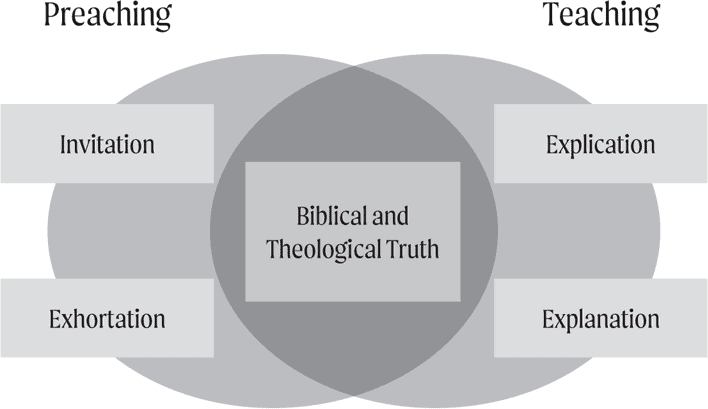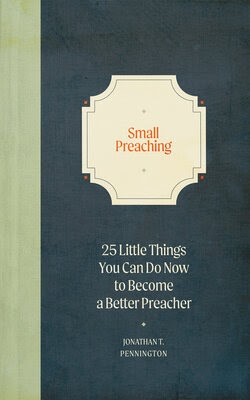Is there a difference between preaching and teaching?
This question is one of many that professor and preacher Jonathan T. Pennington addresses in his book Small Preaching: 25 Little Things You Can Do Now to Become a Better Preacher.
Keep reading to explore the difference between preaching and teaching—and why it’s important to understand—excerpted from Small Preaching.
***
I recently had lunch with a former student who is now 10 years into planting a growing inner-city church. He was asking my advice about how to build an educational plan that would provide his people with a richer and broader theological education. He was lamenting that there was so much his people needed to learn. His sermons were already long and often complicated, and he felt the need to say even more. My advice to him: you’re trying to do too much in your sermons. Preach shorter sermons and teach in other venues.
This good pastor’s problem—one that is common for all of us who value theological education—is that he had not yet gotten clear in his mind the important distinction between preaching and teaching. As a result of this conflation, he was trying to do things with his sermons that can only be done with teaching, to the detriment of both his preaching and his church members’ growth. . . .

The difference between preaching and teaching
We can define preaching as the invitational and exhortational proclamation of biblical and theological truth. Teaching, by contrast, is the explanation and explication of biblical and theological truth.
What is shared between Christian preaching and teaching is the content—biblical and theological truth. The difference lies in the mode and immediate goal.
Preaching is biblical and theological content selected and presented in a mode of proclamation with the immediate goal of invitation and exhortation.
Teaching is biblical and theological content presented in a more detailed and systematic way for the purpose of explaining and unpacking complex issues, their interconnectedness, and their implications. There is overlap, but there is also distinction.
But such verbal definitions only get us so far. It is also helpful to conceptualize the relationship of preaching and teaching with a Venn diagram.

Both preaching and teaching communicate biblical and theological truth, but their modes and goals are different.
We can also approach the preaching-teaching distinction from another angle: Preaching is monological, while teaching is dialogical. Preaching is communication that moves in only one direction, from the preacher in the pulpit to the hearers in the pews. (Even in a vibrantly interactive setting such as is common in the black church, the content is given by the preacher while the congregation provides vocal, and sometimes musical, encouragement.)
Teaching, on the other hand, if done well, is dialogical by nature. The communication of content is driven by the teacher, but questions from the hearers shape the conversation and interchange that happens in the classroom. Good teaching is inherently dialogical.
The monological-versus-dialogical distinction means that there are topics that can and should only be handled in the educational classroom, where feedback can be given, questions asked, and clarifications made. (For example: textual criticism, theodicy, hermeneutics, etc.) This is not possible in the monological situation of a sermon. Thus, the goal and content of preaching should be kept clearly distinct from what can be done through teaching. Preaching and teaching are overlapping but different functions of the pastor’s work.
Through our dialogical conversation, my former student came to see the value of what I was advising him. His sermons can be meaty and deep in theological and biblical content—as long as he keeps the mode and ultimate goal in mind when he is writing and delivering his messages. Preaching exhorts and invites.
He came to see that what his church also needs is another kind of biblical and theological communication—a separate venue where he and other teachers can address a raft of topics and do so focusing on nuanced explication in a dialogical environment.
Kept distinct but working in tandem, preaching and teaching together serve the needs of God’s church.
***
Bigger isn’t always better, and that includes church ministry and preaching too. Start improving your sermons with simple but practical tips in Small Preaching by Jonathan Pennington.
Small Preaching isn’t just another book about the philosophy of preaching or even how to preach well. Rather, Pennington says he wrote the book to help readers take baby steps toward what he calls “intentionally better preaching.”1
Full of small ideas you can try today with chapters like “Sermon Writing as Sculpture,” “The First Minute of a Sermon,” and “At Weddings and Funerals, Be a Guide,” these bite-sized essays “can be good—and even revolutionary”2 to your preaching.
Related articles
- J. I Packer on Preaching and Listening to Sermons
- 8 Principles for Planning Your Preaching Calendar
- Preaching? Drain the Liquid before you Give It to Others
- Preaching to the Heart of the Asian American Experience
Related resources
Small Preaching: 25 Little Things You Can Do Now to Make You a Better Preacher
Regular price: $12.99
Theology Is for Preaching: Biblical Foundations, Method, and Practice
Regular price: $26.99
- Jonathan T. Pennington’s, Small Preaching: 25 Little Things You Can Do Now to Become a Better Preacher, “Distinguishing between Preaching and Teaching” (Lexham Press, Bellingham, WA, 2021), 29.
- Pennington, 29.







